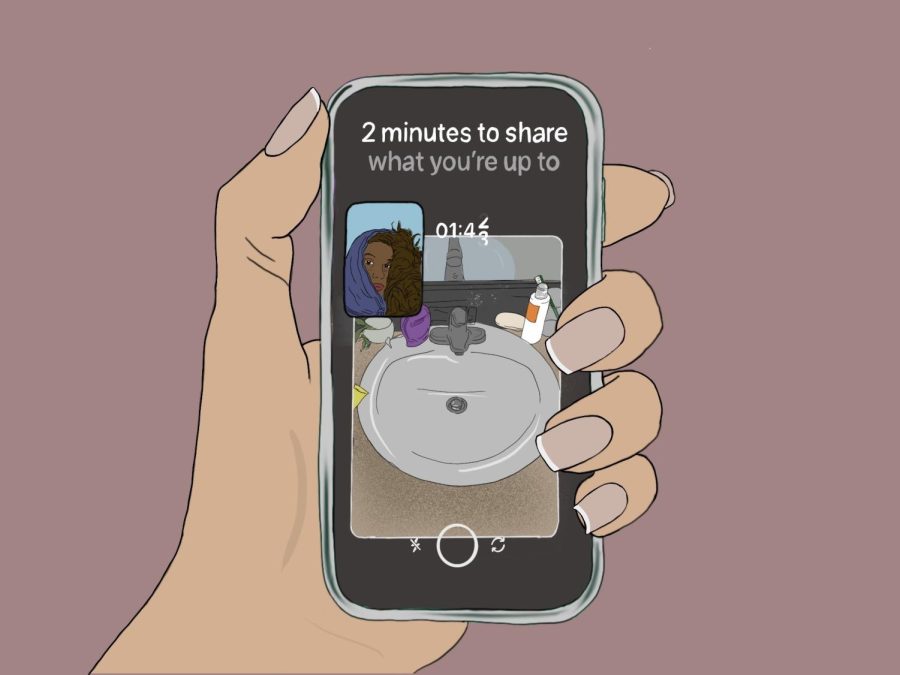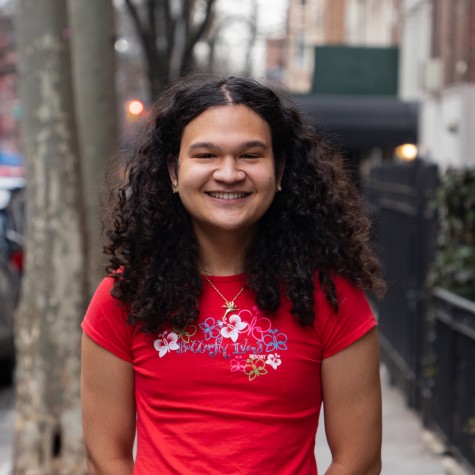Can social media app BeReal deliver on its eponymous promise?
NYU students have mixed feelings on whether the BeReal app provides its users with a truly genuine social media experience.
BeReal is a social media app that promotes a casual, unfiltered experience. (Staff Illustration by Aaliya Luthra)
February 24, 2022
Like many NYU students, I prefer the casual photo dump to the edited selfie, a preference that’s taken to the extreme by the social media app BeReal: every day, you’re given a two-minute window to post captures from your phone’s front and back cameras.
The experience can make your heart race, but does it really produce an authentic, real image of yourself? As some college students seek out healthier forms of social media, some at NYU told WSN about their thoughts on BeReal’s approach to social networking.
Launched in 2020, BeReal promotes itself as a new platform for casual and unfiltered social media. For a company growing its on-campus presence at many universities, its online presence is quite limited.
“No filters. No likes. No followers. No bullshit. No ads,” the singular promotional video on Instagram states.
The app functions like a fusion of Snapchat and Instagram — users upload one post a day to a friends-only feed that lasts for roughly 24 hours. Having spent almost a year on BeReal, Tisch junior Seamus Slattery believes he has captured some of his truest moments on the app.
“From one night’s party to the next morning’s hangover, BeReal sees some of my hottest selfies,” Slattery said. “Usually it’s just, like, me and my bedroom wall.”
Unlike other social media platforms, BeReal demands real-time engagement. All users receive a notification at the same time — but at a different time every day — alerting them to capture and upload their BeReal image within two minutes of receiving the message. If you want to see what your friends are up to, you must first post a photo before you can even access your feed — and no, it’s not as simple as just taking a selfie.
The app captures images from your front and back camera and uploads them together. The process is designed to curate authenticity, but for some, it’s become a chore.
“It’s kind of a one-trick pony in the way that there’s really only one function and after a little bit of time — if nobody on your feed is keeping it interesting, you start to lose interest,” Slattery said. “I think that BeReal is destined to flop.”
Grayson Lee Kim, a CAS junior and BeReal college ambassador, foresees that BeReal could become the new, healthier Instagram through its authentic experience.
“There are no filters, no materialistic qualities, no B.S.,” Kim said. “The app presented my true, authentic self, which can seem vulnerable on a social media platform.”
The app attempts to provide an uncurated, temporary social feed — Kim finds this unique quality to be one of its downsides.
“Although it is authentic and surely a healthier social media platform, I don’t get to keep up with my friends and family in the same manner as Instagram,” Kim said.
Tisch sophomore Yanni Bitis downloaded BeReal in early February and, unlike Kim, says he doesn’t like it at all.
“The app itself doesn’t really work that well, and it’s always kind of glitchy, so you don’t really get a great user experience from it,” Bitis said.
Citing issues with uploading photos and sending RealMojis — an in-app service by which users create emojis from their photos — Bitis struggled to stay interested in maintaining his BeReal presence. Like Slattery, Bitis has doubts about the app’s longevity.
“I don’t really think it’s thriving,” Bitis said. “I don’t think it’s going to pick up.”
With mixed experiences at NYU, whether or not BeReal will overtake major social media platforms is still up in the air. While the app embraces candidness and authenticity, it may not be any better than a photo dump.
Contact Derek Kamakanaaloha Soong at [email protected].




























































































































































